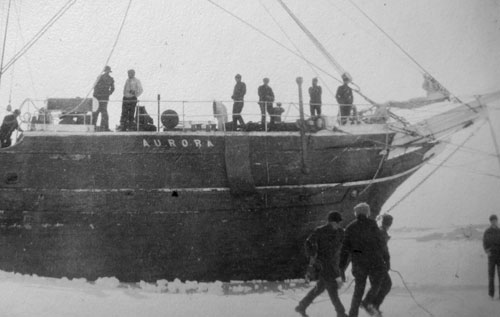
MY CAPTAIN, MY CAPTAIN. JOHN DAVIS AND THE ANTARCTIC EXPEDITIONS
The Heroic Age of Antarctic exploration could never have happened without the ships that carried the adventurers to the White Continent.
The early expeditions all had official names but their informal name usually related to the ships they came on, Scott’s ‘Discovery’ and ‘Terra Nova’, or Shackleton’s ‘Nimrod’ and ‘Endurance’ expeditions for instance.
But besides good ships, Antarctica required good captains and perhaps the best of them all was John Davis. Named ‘Gloomy’ by his crew for his reserved manner, Davis was known as a hard taskmaster; a necessary quality for a captain commanding a ship in difficult conditions.
Davis met Ernest Shackleton at an exhibition of polar equipment by chance and was appointed Chief Officer on Shackleton’s 1907–09 Nimrod expedition. On this journey, Davis formed a long-lasting friendship with young expeditioner Douglas Mawson. United by a passion for research expeditions, their friendship withstood disagreements in a difficult and remote environment where wrong decisions could mean loss of life.
Mawson would go on to appoint Davis captain of the Aurora for the 1911–1914 Australasian Antarctic Expedition (AAE). The expedition encountered many challenges: dangerous weather, navigating previously uncharted coastline, and problems with the ship.
Davis would eventually command several crucial AAE voyages, establishing and relieving expeditioners at sub-Antarctic Macquarie Island, and the Antarctic continental bases at Commonwealth Bay and the Shackleton Ice Shelf. In 1914, the Aurora returned to retrieve the parties on each of the bases. Reaching Commonwealth Bay, Davis learnt that Mawson’s sledging party was missing. As a result, six men volunteered to remain at the base to search for Mawson’s traverse party.
Davis had to make the difficult decision: whether to risk further bad weather at Commonwealth Bay and await Mawson’s return, or to retrieve the Shackleton Ice Shelf base led by Frank Wild. After retrieving Wild’s party, the Aurora could not return through difficult ice conditions to Commonwealth Bay, and sailed on to Australia.
After the deaths of fellow expeditioners Belgrave Ninnis and Xavier Mertz, Mawson survived the perilous journey back to the base alone, missing the ship by hours. Subsequently, he overwintered with the remaining men.
On his return to Australia in 1914, Mawson married Francisca (Paquita) Delprat, with Davis as his best man. In 1916, Davis returned to the Antarctic sailing the Aurora to rescue Shackleton’s shore party, left at McMurdo Sound to support the expedition’s attempt to cross Antarctica from the Weddell Sea.

The party, which had spent two winters in Antarctica with inadequate supplies, was relieved to be rescued by Davis and transported safely to New Zealand.
Captain Davis was once again the pilot for the expedition ship on the 1929 voyage of the British, Australian and New Zealand Antarctic Research Expedition (BANZARE) under Mawson’s leadership during which, unfortunately, he and Mawson fell out so angrily that they stopped speaking to each other, communicating solely by notes instead. The quarrel was a sad end to what should have been a lifelong friendship cemented by the two men’s loyalty to each other on the AAE
From 1947 to 1962, Davis continued his involvement in Australian Antarctic interests as a member of the Government’s advisory planning committee for Antarctic policy and endeavours. Davis was twice recipient of the King’s Polar Medal.
In 1957, his contribution was honoured by the Australian Antarctic Division, naming one of its Antarctic research stations, Davis. The Davis Sea was named in recognition of his incredible skill in negotiating the dangerous waters and ice around Antarctica.
He died in 1967 in Melbourne and his portrait hangs in the ‘gallery of explorers’ in the Royal Geographical Society’s London headquarters. I think it could be said that it is likely that Antarctic exploration would have been less successful if Davis had not been involved.
